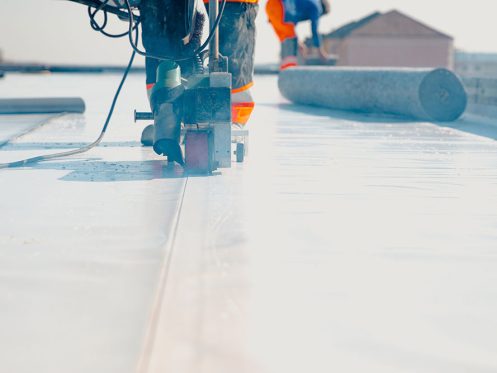There are many types of commercial roofing systems, and each one is made to fit the needs of the building and the budget of the owner. The type of roof you have on your commercial property will play an important role in maintaining your building’s overall health. It can also affect the longevity of the roof itself. Even other factors (such as weather and exposure to exterior elements) can determine how your roof will hold up over time, which is why you need to speak to a professional before you make a decision.
Common Types of Commercial Roofing
There are many types of commercial roofing, but there are some solutions that are more widely used on commercial properties. Commercial roofs will usually be either flat or low-slope, which narrows your options to some extent. The most common types of commercial roofing include but may not be limited to:
- Built-Up Roofing (BUR) — This roofing system will have a lifespan of 15-30 years and works better in warmer climates. While it can take longer to install, the cost of maintaining it is low.
- TPO Roofing — This type of commercial roofing can last up to 30 years and has strong reflective properties. It also has some resistance to fire and chemicals, as well as a number of options with regard to insulation and installation.
- PVC Roofing — This type of roofing system is lightweight and has a high degree of flame resistance. It’s also environmentally friendly and has a long lifespan.
- Hot Mop — This type of roof is affordable, dependable, and can be installed quickly. It can cover roofs with more unusual shapes and can be easily re-roofed.
- Torch Down — This type of commercial roofing can last up to 20 years and is extremely durable. It’s also flexible and has low to no maintenance costs.
- R-Panel Metal Roofing — This type of roofing is affordable and extremely durable. It can be installed over existing shingles and requires very little maintenance.
The difference between commercial roofing and what’s available on the residential market is in the types of options that are available. For residential roofs, both aesthetics and practicality are taken into account. But the commercial market doesn’t care as much about how the roof looks. They just need to do what is necessary to protect the property. Another big difference is in how problems are usually solved. A residential roof may only need some patching on the affected area, but a commercial roof may need another layer of coating for the affected area or even the entire roof.
Choosing the Right Commercial Roofing System
If you’re planning to build a commercial property or need to replace a commercial roof, it’s important to make the right decision. You have a lot of options for a commercial roofing installation, but you want to find one that works best for your specific project. Here are some important things that you should take into consideration:
- Climate — The commercial roofing system you choose to install must be able to withstand the climate in which it is located.
- Existing Roofing System — Your commercial roofing installation may need to be installed on top of your existing one. If that’s the case, you need to make sure the roofing material is compatible.
- Existing Structures and Protrusions — Before you decide what type of commercial roofing system to install, you need to think about what kind of structures and protrusions are already on the property.
- Types of Business Operations — This can play an important role in determining what type of commercial roofing installation you need. A warehouse or industrial complex may not need a roof that’s energy efficient, but an office building might.
- Cost — Commercial roofing systems can come in a number of price points, so the amount of money you’ll spend can depend on your budget. If cost is a major consideration, look at some options that are less expensive (such as asphalt shingles and metal).
- Functionality — A commercial roofing installation is meant to serve a specific purpose, but it should also complement the overall look of your property.
- Building Codes — Commercial roofing systems are required to meet local building codes, so you want to choose one that does. Be sure to contact your city’s planning department to see if it’s allowed, because not all commercial roofing materials are legal in every area (even if they meet all the other requirements).
- Repair and Maintenance Requirements — Every commercial roofing installation will need some kind of repair and maintenance, but it will depend on what type of material is being used. It can also depend on the quality of the installation and how well it has been maintained.
If you’re looking for one of the best roofers in Corpus Christi to install a roof on your commercial property, be sure to reach out to Bayfront Roofing.
